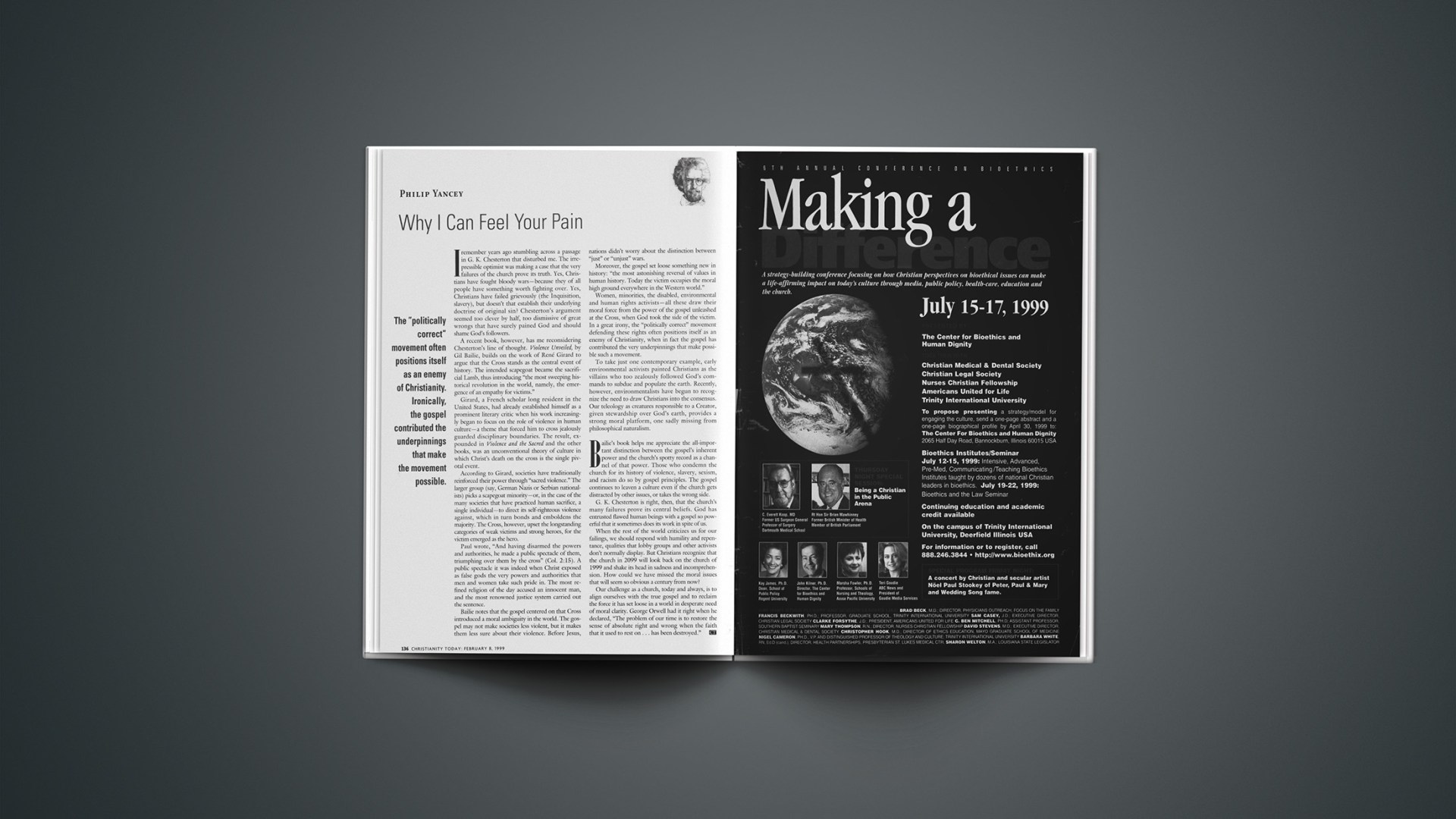I remember years ago stumbling across a passage in G. K. Chesterton that disturbed me. The irrepressible optimist was making a case that the very failures of the church prove its truth. Yes, Christians have fought bloody wars—because they of all people have something worth fighting over. Yes, Christians have failed grievously (the Inquisition, slavery), but doesn’t that establish their underlying doctrine of original sin? Chesterton’s argument seemed too clever by half, too dismissive of great wrongs that have surely pained God and should shame God’s followers.
A recent book, however, has me reconsidering Chesterton’s line of thought. Violence Unveiled, by Gil Bailie, builds on the work of René Girard to argue that the Cross stands as the central event of history. The intended scapegoat became the sacrificial Lamb, thus introducing “the most sweeping historical revolution in the world, namely, the emergence of an empathy for victims.”
Girard, a French scholar long resident in the United States, had already established himself as a prominent literary critic when his work increasingly began to focus on the role of violence in human culture—a theme that forced him to cross jealously guarded disciplinary boundaries. The result, expounded in Violence and the Sacred and the other books, was an unconventional theory of culture in which Christ’s death on the cross is the single pivotal event.
According to Girard, societies have traditionally reinforced their power through “sacred violence.” The larger group (say, German Nazis or Serbian nationalists) picks a scapegoat minority—or, in the case of the many societies that have practiced human sacrifice, a single individual—to direct its self-righteous violence against, which in turn bonds and emboldens the majority. The Cross, however, upset the longstanding categories of weak victims and strong heroes, for the victim emerged as the hero.
Paul wrote, “And having disarmed the powers and authorities, he made a public spectacle of them, triumphing over them by the cross” (Col. 2:15). A public spectacle it was indeed when Christ exposed as false gods the very powers and authorities that men and women take such pride in. The most refined religion of the day accused an innocent man, and the most renowned justice system carried out the sentence.
Bailie notes that the gospel centered on that Cross introduced a moral ambiguity in the world. The gospel may not make societies less violent, but it makes them less sure about their violence. Before Jesus, nations didn’t worry about the distinction between “just” or “unjust” wars.
Moreover, the gospel set loose something new in history: “the most astonishing reversal of values in human history. Today the victim occupies the moral high ground everywhere in the Western world.”
Women, minorities, the disabled, environmental and human rights activists—all these draw their moral force from the power of the gospel unleashed at the Cross, when God took the side of the victim. In a great irony, the “politically correct” movement defending these rights often positions itself as an enemy of Christianity, when in fact the gospel has contributed the very underpinnings that make possible such a movement.
To take just one contemporary example, early environmental activists painted Christians as the villains who too zealously followed God’s commands to subdue and populate the earth. Recently, however, environmentalists have begun to recognize the need to draw Christians into the consensus. Our teleology as creatures responsible to a Creator, given stewardship over God’s earth, provides a strong moral platform, one sadly missing from philosophical naturalism.
Bailie’s book helps me appreciate the all-important distinction between the gospel’s inherent power and the church’s spotty record as a channel of that power. Those who condemn the church for its history of violence, slavery, sexism, and racism do so by gospel principles. The gospel continues to leaven a culture even if the church gets distracted by other issues, or takes the wrong side.
G. K. Chesterton is right, then, that the church’s many failures prove its central beliefs. God has entrusted flawed human beings with a gospel so powerful that it sometimes does its work in spite of us.
When the rest of the world criticizes us for our failings, we should respond with humility and repentance, qualities that lobby groups and other activists don’t normally display. But Christians recognize that the church in 2099 will look back on the church of 1999 and shake its head in sadness and incomprehension. How could we have missed the moral issues that will seem so obvious a century from now?
Our challenge as a church, today and always, is to align ourselves with the true gospel and to reclaim the force it has set loose in a world in desperate need of moral clarity. George Orwell had it right when he declared, “The problem of our time is to restore the sense of absolute right and wrong when the faith that it used to rest on … has been destroyed.”
Copyright © 1999 Christianity Today. Click for reprint information.










